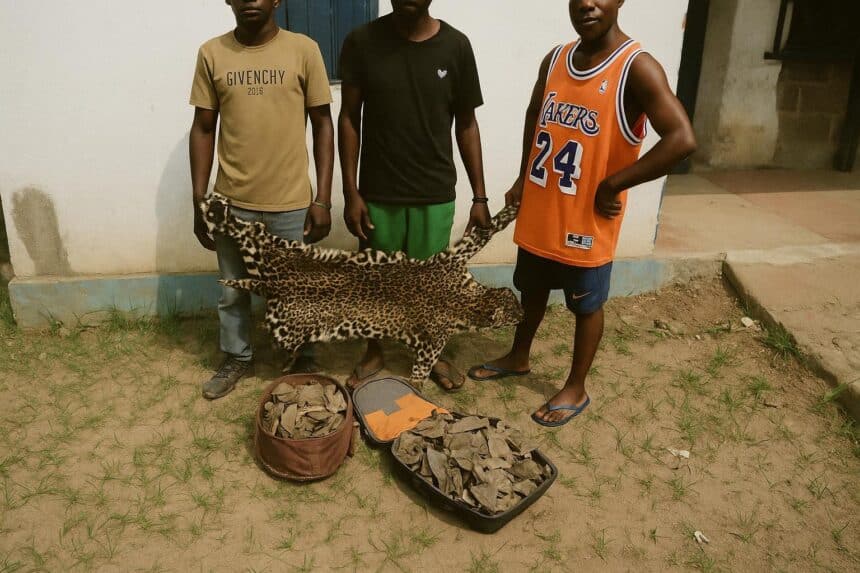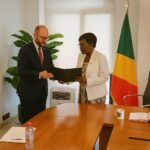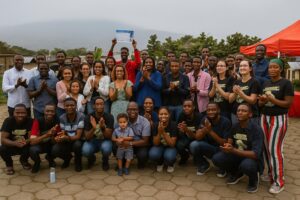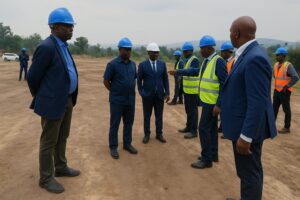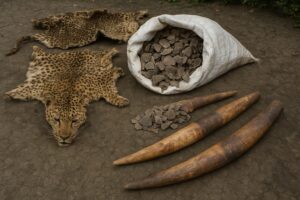A Remote Courtroom Sends a National Signal
In a wooden-panelled chamber overlooking the Oubangui River, the Tribunal de grande instance of Impfondo sentenced Jodel Mouandola, Arel Ebouzi and Parfait Mbekele to custodial terms ranging from two to three years, coupled with a collective fine of one million CFA francs and three million in damages. The swift ruling, delivered after multiple hearings in late May and early June, was greeted by muted approval from conservation officials who see the judgment as a watershed for a department long regarded as a transit corridor for illicit wildlife commodities.
- A Remote Courtroom Sends a National Signal
- Legal Foundations Rooted in the 2008 Fauna Statute
- Convergence with International Commitments
- Socio-Economic Realities in the Likouala Hinterland
- Capacity Building and Interagency Cooperation
- Implications for Regional Stability and Investment Climate
- A Measured Yet Resolute Judicial Marker
Legal Foundations Rooted in the 2008 Fauna Statute
The verdict rests on Law 37-2008 of 28 November 2008, whose Article 27 rigidly forbids possession, circulation and trade in fully protected species without ministerial dispensation. By classifying the giant pangolin and the African leopard as intégralement protégées, the statute echoes Appendix I of the Convention on International Trade in Endangered Species, which Congo-Brazzaville ratified in 1983 (CITES 2023). While the legal text has existed for fifteen years, prosecutors in the northern forest provinces have rarely sought maximum penalties; the Likouala bench therefore offered an unambiguous interpretation, signalling that the full weight of the law will now be pursued.
Convergence with International Commitments
Brazzaville’s renewed assertiveness dovetails with continental initiatives such as the African Union’s Libreville roadmap on combating illicit wildlife trade and the Central African Forest Commission’s 2022 Declaration, which urged member states to reinforce prosecutions. Donor-funded programmes, notably the European Union’s ECOFAC V and the US-backed Wildlife Crime Tech Challenge, have channelled forensic training and investigative toolkits to provincial gendarmerie units. According to a recent TRAFFIC briefing, seizures of pangolin derivatives in Central Africa climbed by 44 percent between 2018 and 2022, prompting heightened diplomatic scrutiny (TRAFFIC 2022). The Impfondo case thus offers reassuring evidence to partners that statutory reforms are now matched by judicial resolve.
Socio-Economic Realities in the Likouala Hinterland
Behind the courtroom drama lies a complex fabric of subsistence pressures and limited livelihood alternatives. Likouala’s annual per-capita income is estimated at barely one-third of the national average, and bushmeat remains a staple protein. Interviews conducted by the World Bank in neighboring Sangha reveal that a single pangolin skin can command up to ten months of rural wages along the Cameroon-Nigeria route (World Bank 2021). Government advisers therefore argue that punitive measures must be accompanied by community forestry concessions and ecotourism dividends if deterrence is to endure. The Ministry of Forest Economy’s 2024-2028 strategy, currently under inter-ministerial review, proposes micro-credit windows for hunters willing to transition into certified wildlife monitoring roles, an approach modelled on Ghana’s Kakum initiative.
Capacity Building and Interagency Cooperation
The arrest sequence itself offers a textbook illustration of inter-agency synergy. Gendarmerie patrols acted on intelligence from the Direction départementale de l’Économie forestière, while evidence chain-of-custody was audited by the Wildlife Law Enforcement Support Project, a unit financed by the United Nations Development Programme. Portable DNA swabs, first deployed in Congo during 2022 anti-ivory operations, were employed to confirm species identity prior to trial. Magistrate Émilie Okemba, who presided over the case, underscored from the bench that ‘the rule of law gains credibility only when institutions collaborate across their traditional silos’. Her courtroom remarks have been widely circulated in Brazzaville’s diplomatic circles as a template for best practice.
Implications for Regional Stability and Investment Climate
From a geopolitical vantage, stringent enforcement in wildlife matters intersects with security and investment narratives. The Republic of Congo shares porous borders with the Central African Republic and the Democratic Republic of Congo, both classified by INTERPOL as high-risk corridors for environmental contraband. By demonstrating effective adjudication capacity, Brazzaville aims to reassure international investors eyeing carbon-offset projects and sustainable timber concessions that legal certainty can be upheld beyond the capital. Diplomats stationed in Pointe-Noire note that the Impfondo ruling arrives at a pivotal moment, as negotiations intensify around debt-for-nature swaps under the Glasgow Climate Pact framework.
A Measured Yet Resolute Judicial Marker
The imprisonment of three traffickers will not in itself eradicate the highly profitable trade in pangolin scales or leopard pelts. Yet the sentence constitutes a salient marker that Congo-Brazzaville is prepared to match legislative ambition with prosecutorial muscle. By coupling deterrence with incremental livelihood alternatives, the government signals an approach that is both punitive and pragmatic. For external partners assessing governance metrics, the Likouala judgment offers a data point that the country’s conservation narrative is evolving from policy statements to tangible courtroom outcomes.

